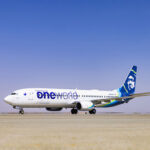Feeling uncomfortable on a plane is a common experience. Travel stress and anxiety can manifest in various ways, including skin issues, fatigue, and that uncomfortable post-flight bloating. Bloating, as described by health resources, involves a sensation of fullness and discomfort in your stomach, often accompanied by pain, rumbling noises, a distended abdomen, and yes, sometimes increased flatulence. It’s unpleasant and can be embarrassing.
But is there a real reason why bloating and gas seem to worsen when we fly? Is it just stress, or is there a scientific explanation? And more importantly, can we do anything to prevent it? To understand this better, we consulted with Dr. Jo Woodhurst, a nutrition expert at Ancient + Brave, to shed light on airplane gas and offer practical advice.
Why Air Travel Can Increase Gas and Bloating
“Yes, it’s absolutely true that people often feel more bloated and gassy on a plane,” explains Dr. Woodhurst. She points to two primary reasons for this phenomenon: gas-related bloating in the gut and bloating due to water retention. The first is significantly influenced by changes in air pressure during flights. “When you’re flying at high altitudes, around 40,000 feet, the cabin air pressure is considerably lower than what your body is accustomed to at sea level,” she notes. “As air pressure decreases, gases expand – you might notice this with a snack packet on a flight. The same gas expansion occurs in your digestive system, leading to feelings of discomfort and increased gas.”
The second type of bloating, water retention, is less directly linked to flying itself. It’s more of a general bodily response that can occur on the ground as well as in the air. “Bloating from water retention results from how your blood circulates and your body’s efficiency in processing and eliminating fluids,” Dr. Woodhurst clarifies. While less about gas directly, it contributes to the overall feeling of being bloated and uncomfortable during and after flights.
What to Eat and Drink Before Flying to Minimize Gas?
Certain foods and beverages can worsen bloating and gas, while others might help alleviate symptoms. “Individual reactions to foods vary greatly, so it’s essential to know which foods typically cause you gas or bloating, such as wheat, dairy, or cruciferous vegetables,” Dr. Woodhurst advises. “It’s best to avoid these before your flight.”
She further suggests, “Limiting high-fiber foods like beans, pulses, and spicy foods before flying is wise, as some people find them hard to digest, leading to gas and bloating. However, once you reach your destination, ensure you consume plenty of fiber to prevent travel-related constipation.” Dr. Woodhurst also cautions against artificial sweeteners and fizzy drinks, as they are common culprits for bloating. Furthermore, she recommends avoiding chewing gum, as it can cause you to swallow excess air, contributing to gas and bloating. By making smart choices about what you consume before and during your flight, you can proactively manage airplane gas and bloating.
